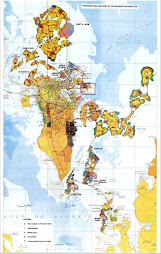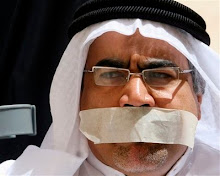Rights movement says Bahraini government has blacklisted Lebanese publishers at an upcoming book fair.
A human rights organization has accused the Bahraini government of preventing Lebanese publishers from selling their wares at an upcoming book fair.
The Movement of Liberties and Democracy-HAQ alleges that the government is trying to block publishers from disseminating Shi’ite literature the government does not want displayed.
The Bahraini Al-Wasat reported that the Bahraini Ministry of Culture and Information gave a shipping company a list of 25 publishers, asking that books belonging to these publishers not be imported for the Bahrain International Book Fair, slated for 17-27 of March, 2010.
Abdejalil Al-Singace, Director of Human Rights Bureau at Movement of Liberties and Democracy-HAQ, argued the books in question were being targeted because they published literature of the Shi’ite sect.
“It’s the first time books were banned in this way,” he told The Media Line. “The old procedure was either to confiscate the books at the port or to take them off the shelves, as happened in 2004. But that caused a media fiasco and it was an embarrassment for the authorities. Now, I think they’re trying to avoid embarrassment and avoid criticism from local and international NGOs by not leaving any fingerprints.”
The ministry denies the existence of a blacklist and says the publishers have simply not yet received permits for bureaucratic reasons.
The ministry is not banning Lebanese publishers from the fair, Abdel Qader Aqil, who is in charge of the arts and culture division at the Ministry of Culture and Information told Al-Wasat. He said the matter was merely bureaucratic and had “nothing to do with sectarian favoritism.”
He said the permits for these publishing houses to participate in the fair had not yet been processed and that the ministry would try solve it by the second week of February.
“We have no intention or inclination to stop a Lebanese publisher or other [publishers]” Aqil said. “What is happening now is a procedural matter and there are other publishers from other countries that have also not got permission, including publishers from Egypt. The reason has to with regulations and space and we’re trying to get as many publishers possible to participate.”
“There are five Lebanese publishers on the list that were previously not allowed participation but in recent days they were given permission,” he added.
But Lebanese publishers, according to Al-Wasat, said these five publishers were only given permits following intervention by the head of the Lebanese Publisher’s Union, Samira Assi.
The report in Al-Wasat included a copy of a letter sent from the Kabalan shipping company to the Lebanese publishers confirming that the company would not be shipping their books to the fair.
Kabalan stressed in the letter that they would not be shipping the books “for the time being.” The company said the reasons for this were routine and procedural, which could be sorted out soon.
Ahmad Kabalan, a representative of the Kabalan shipping company told The Media Line in an email that there was “no blacklist.”
Al-Singace said it was likely the company did not want to draw unwanted attention. He said it is part of a political maneuver to stifle religious freedom in Bahrain, especially against Shi’ites, who constitute a majority in the Gulf country, but suffer from discrimination.
“The list of targeted publishers includes those publishing Shi’a books in particular,” Al-Singace said. “Those confiscated in the 2004 exhibition were mostly Shi’a books and some of them are historic, covering different historic periods in Bahrain, and they were considered subversive…We assume this is part of a systematic attack on the Shi’as religious freedoms.”
Though Bahrain’s leadership is Sunni, Shi’ites have a 60-70% majority among the population.
“The authorities are trying to change that situation,” Al-Singace said. “[The government] is importing tens of thousands of Sunnis from certain backgrounds – Syria, Jordan, Iraq, Saudi Arabia, Yemen, and Baluchistan of Pakistan - in order to change the demography by converting the majority Shi’a into a minority and controlling the output of any election process.”
Tensions between Sunnis and Shi’ites, and reports of discrimination against Shi’ites in Bahrain are rife.
According to the U.S. State Department’s most recent report on religious freedom in Bahrain, Shi'a Muslims comprise the majority of the poor citizen population in Bahrain and have a higher unemployment rate than Sunni Muslims who dominate in government positions, the managerial ranks of the civil service, the military and the security forces.
“Shi'as were under-represented in the Ministry of Education in both the leadership and in the ranks of head teachers who teach Islamic studies and supervise and mentor other teachers,” the 2009 report said.
“At the secondary school level, out of more than a dozen Islamic studies head teachers, only two were Shi'a. Although there were many Islamic studies teachers who were Shi'a, school authorities discouraged them from introducing content about Shi'a traditions and practices and instructed them to follow the curriculum.”
The report said the Ministry of Information continued to ignore requests by the government-run TV station to broadcast Friday sermons live from Shi'a mosques, as it did from Sunni mosques.
“Although there were exceptions, the Sunni Muslim citizen minority enjoyed favored status,” it concluded. | 









